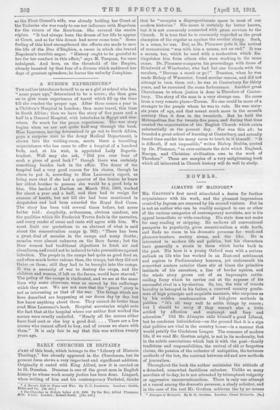EARLY CHURCHES IN BRITAIN*
AJA.ET of this book, which belongs to the "Library of Historic Theology," has already appeared in the Churchman, but its present form shows a very important and significant addition. Originally it ended with King Alfred, now it is carried on to St. Dunstan. Dunstan is one of the great men in English history to whose work scanty justice has been done. Lingard, when writing of him and his contemporary Turketul, thinks " A Nurse's Life in Peace and War. By E. C. Laurence, London : Smith, Elder and Co. 15a. not.] f The Church,. in Britain before A.D. 1000. By tho Boy. Alerod Hammer, P.D. 2 vols. London: Hobert Soon. [10s. not.' that he "occupies a disproportionate space in most of our modern histories." His name is certainly far better known, but it is not commonly connected with great services to the Church. It is true that he is commonly regarded as the great champion of the regular as against the secular clergy. Such, in a sense, he was. But, as Dr. Plummer puts it, the revival of monasticism "was with him a means, not an end." It was a means, too, which he used with a moderation which dis- tinguishes him from others who were working in the same cause. Dr. Plummer compares his proceedings with those of Ethelwold of Winchester, who had but one formula with the seculars, "Become a monk or go !" Dunstan, when ho was made Bishop of Worcester, found secular canons, and did not attempt to turn them out; he was at Canterbury for thirty years, and he exercised the same forbearance. Another great Churchman to whom justice is done is Theodore of Canter- bury. The story of the man is a very strange ono. Ho came from a very remote place—Tarsus. No one could be more of a stranger to the people whom he was to rule. He was sixty- six years of ago, and that meant much more in the seventh century than it does in the twentieth. But he held the Metropolitan See for twenty-five years, and during that time created the organization of the English Church which exists substantially at the present day. Nor was this all: he founded a great school of learning at Canterbury, and actually found time amidst his many cares to teach in it himself. "It is difficult, if not impossible," writes Bishop Stubbs, quoted by Dr. Plummer, " to over-estimate the debt which England, Europe, and Christian civilization owe to the work of Theodore." These are samples of a very enlightening book which all interested in Chun* history will do well to study.






































 Previous page
Previous page